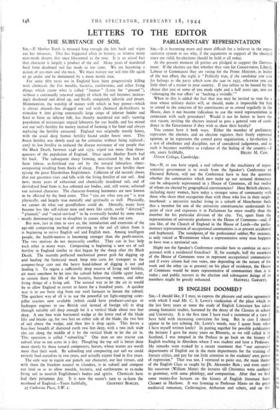Stu,—If, as you have urged, a real reform of the
machinery of repre- sentative government is to result from the Speaker's Conference on Electoral Reform, will not the Conference have to face the question whether the communities which now make up our national democracy can be adequately represented in a House of Commons, all but twelve of whom are elected by geographical constituencies? Most British electors, including many women, have today a stronger sense of community with those who share their occupation than with those who live in their neigh- bourhood: a university teacher living in a suburb of Manchester finds that a member for one of the university constituencies understands his point of view and expresses it in Parliament far more readily than the member for his particular division of the city. Yet, apart from the representation of university graduates in the House of Commons—and. if you like, of the Church of England in the House of Lords—the parlia- mentary representation of occupational communities is at present accidental and haphazard. The standpoint,. of the professional soldier,ofor instance, is only voiced at Westminster when a representative army man happens to have won a territorial seat.
Might not the Speaker's Conference consider how to combine an occu- pational with a residential franchise? If, for example, half the members of the House of Commons were to represent occupational communities and if every citizen had two votes, one depending on the nature of his work and the other (as at present) on his place of residence, the House of Commons would be more representative of communities than it is today ; and public interest in the election and subsequent doings of its
members might be greatly enhanced. MAXWELL GARNETT.


























 Previous page
Previous page